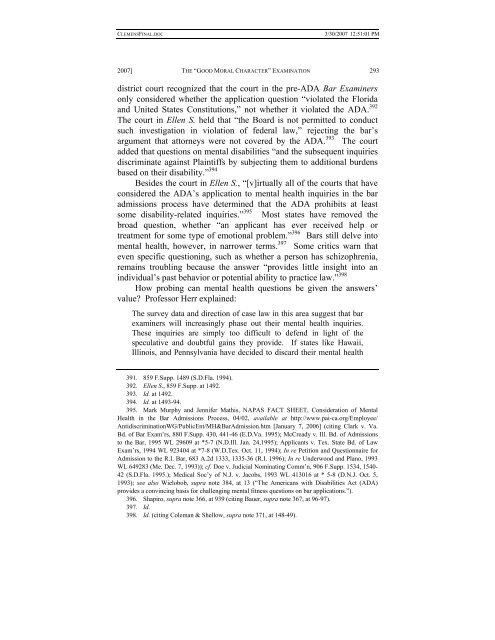Facing the Klieg Lights: Understanding the "Good Moral Character"
Facing the Klieg Lights: Understanding the "Good Moral Character"
Facing the Klieg Lights: Understanding the "Good Moral Character"
Create successful ePaper yourself
Turn your PDF publications into a flip-book with our unique Google optimized e-Paper software.
CLEMENSFINAL.DOC<br />
3/30/2007 12:51:01 PM<br />
2007] THE “GOOD MORAL CHARACTER” EXAMINATION 293<br />
district court recognized that <strong>the</strong> court in <strong>the</strong> pre-ADA Bar Examiners<br />
only considered whe<strong>the</strong>r <strong>the</strong> application question “violated <strong>the</strong> Florida<br />
and United States Constitutions,” not whe<strong>the</strong>r it violated <strong>the</strong> ADA. 392<br />
The court in Ellen S. held that “<strong>the</strong> Board is not permitted to conduct<br />
such investigation in violation of federal law,” rejecting <strong>the</strong> bar’s<br />
argument that attorneys were not covered by <strong>the</strong> ADA. 393 The court<br />
added that questions on mental disabilities “and <strong>the</strong> subsequent inquiries<br />
discriminate against Plaintiffs by subjecting <strong>the</strong>m to additional burdens<br />
based on <strong>the</strong>ir disability.” 394<br />
Besides <strong>the</strong> court in Ellen S., “[v]irtually all of <strong>the</strong> courts that have<br />
considered <strong>the</strong> ADA’s application to mental health inquiries in <strong>the</strong> bar<br />
admissions process have determined that <strong>the</strong> ADA prohibits at least<br />
some disability-related inquiries.” 395 Most states have removed <strong>the</strong><br />
broad question, whe<strong>the</strong>r “an applicant has ever received help or<br />
treatment for some type of emotional problem.” 396 Bars still delve into<br />
mental health, however, in narrower terms. 397 Some critics warn that<br />
even specific questioning, such as whe<strong>the</strong>r a person has schizophrenia,<br />
remains troubling because <strong>the</strong> answer “provides little insight into an<br />
individual’s past behavior or potential ability to practice law.” 398<br />
How probing can mental health questions be given <strong>the</strong> answers’<br />
value? Professor Herr explained:<br />
The survey data and direction of case law in this area suggest that bar<br />
examiners will increasingly phase out <strong>the</strong>ir mental health inquiries.<br />
These inquiries are simply too difficult to defend in light of <strong>the</strong><br />
speculative and doubtful gains <strong>the</strong>y provide. If states like Hawaii,<br />
Illinois, and Pennsylvania have decided to discard <strong>the</strong>ir mental health<br />
391. 859 F.Supp. 1489 (S.D.Fla. 1994).<br />
392. Ellen S., 859 F.Supp. at 1492.<br />
393. Id. at 1492.<br />
394. Id. at 1493-94.<br />
395. Mark Murphy and Jennifer Mathis, NAPAS FACT SHEET, Consideration of Mental<br />
Health in <strong>the</strong> Bar Admissions Process, 04/02, available at http://www.pai-ca.org/Employee/<br />
AntidiscriminationWG/PublicEnt/MH&BarAdmission.htm [January 7, 2006] (citing Clark v. Va.<br />
Bd. of Bar Exam’rs, 880 F.Supp. 430, 441-46 (E.D.Va. 1995); McCready v. Ill. Bd. of Admissions<br />
to <strong>the</strong> Bar, 1995 WL 29609 at *5-7 (N.D.Ill. Jan. 24,1995); Applicants v. Tex. State Bd. of Law<br />
Exam’rs, 1994 WL 923404 at *7-8 (W.D.Tex. Oct. 11, 1994); In re Petition and Questionnaire for<br />
Admission to <strong>the</strong> R.I. Bar, 683 A.2d 1333, 1335-36 (R.I. 1996); In re Underwood and Plano, 1993<br />
WL 649283 (Me. Dec. 7, 1993)); cf. Doe v. Judicial Nominating Comm’n, 906 F.Supp. 1534, 1540-<br />
42 (S.D.Fla. 1995.); Medical Soc’y of N.J. v. Jacobs, 1993 WL 413016 at * 5-8 (D.N.J. Oct. 5,<br />
1993); see also Wielobob, supra note 384, at 13 (“The Americans with Disabilities Act (ADA)<br />
provides a convincing basis for challenging mental fitness questions on bar applications.”).<br />
396. Shapiro, supra note 366, at 939 (citing Bauer, supra note 367, at 96-97).<br />
397. Id.<br />
398. Id. (citing Coleman & Shellow, supra note 371, at 148-49).
















